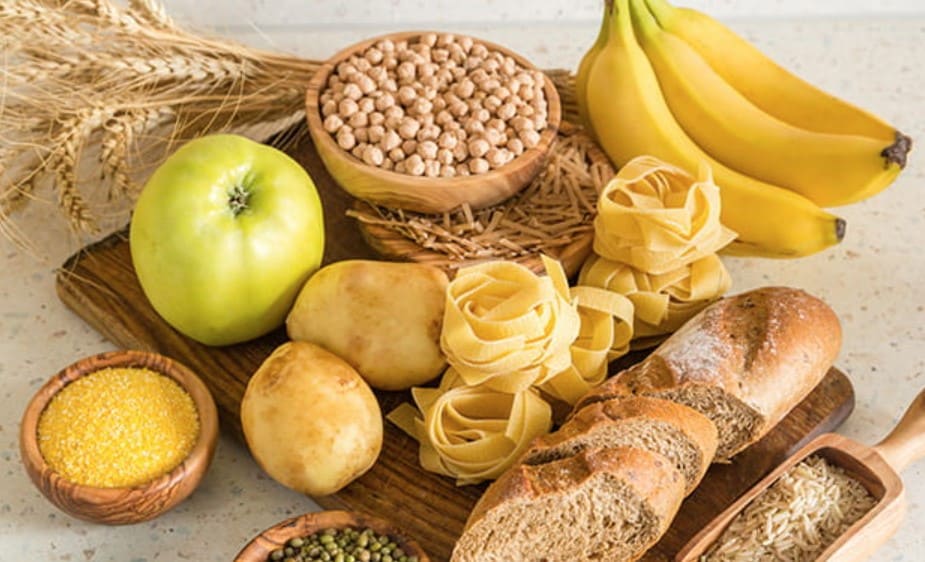Foods without carbohydrates can help you lose weight. This list shows you which foods without carbohydrates are well suited for a low-carb diet.
Food without carbohydrates: what does low carb mean?
Many people would like to do without carbohydrates as much as possible or at least reduce them. A diet that focuses on foods with few carbohydrates is called low carb. In particular, simple carbohydrates from white bread, sweets and the like are no longer on the menu because they are considered real fattening foods. The carbohydrates cause the blood sugar level to rise and this in turn has a decisive influence on fat loss.
Low-carb diet: These foods are taboo
Since they contain a lot of carbohydrates, you should avoid the following foods in a low-carbohydrate diet:
- Sugary foods
- bread
- Muesli
- honey
- Sweets
- potatoes
- pasta
- rice
Which foods have no carbohydrates?
If you want to eat low carb, you don’t have to prepare a complicated shopping list right away.
These foods contain almost no carbohydrates:
- Fish
- poultry
- meat
- eggs
- Dairy products
- nuts
Vegetables without carbohydrates
Vegetables are healthy and usually recommended for a low-carbohydrate diet. It is important to know that there are hardly any vegetables that are completely free of carbohydrates. With many types of vegetables, however, the proportion of carbohydrates is so low that it hardly plays a role and they are therefore counted as carbohydrate-free. Vegetables that are very low in carbohydrates include:
- Mushrooms
- leaf spinach
- asparagus
- cucumbers
- cauliflower
- bamboo shoots
The top 11 list of the best zero carb foods
These low-carb foods are not only real sources of energy, they are also delicious:
1. Avocado – high fat, low carbs
Avocado is high in healthy fats, fiber, vitamins A and E, and potassium. It protects blood vessels, keeps cholesterol levels low and fills you up quickly. The nutrient bomb is one of the foods with few carbohydrates: there are only 9 grams in 100 grams of avocado.
2. Broccoli – pure vitamins without carbohydrates
Broccoli can be eaten raw or cooked and is very rich in vitamins. Vitamin C and K in particular are contained in large quantities. The green vegetables contain about 2 grams of carbohydrates per 100 grams and are therefore good in a low-carb diet.
3. Berries without carbohydrates: These varieties are low carb
The small, sweet fruits are not only full of vitamins, they are also low-carbohydrate foods. Calculated per 100 grams, the proportion of carbohydrates in the following varieties is very low: blackberries (2.7/100 grams), raspberries (4.8 grams), strawberries (5.5 grams), currants (7.3 grams) and blueberries (7.4 grams).
4. Eggs – high protein, low carbs
They consist mostly of protein and fat: there is only one gram of carbohydrates for every 100 grams of eggs. Another plus: Eggs contain tryptophan, an amino acid that stimulates the formation of the happiness hormone serotonin.
5. Yoghurt: High in protein, low in carbohydrates
It contains probiotic bacteria that promote a healthy intestinal flora. Proteins and calcium are also important ingredients. And most importantly, yoghurt contains only about 5 grams of carbohydrates per 100 grams. However, if you generally want to eat low-carb, you should be careful not to eat too much yoghurt.
6. Cheese without carbohydrates: Edam, sheep’s cheese and co.
Most cheeses belong to the group of low-carbohydrate foods. These include Tilsiter, Edam, Camembert and sheep’s cheese. The calcium it contains strengthens teeth and bones. There is also a lot of protein in cheese. The content varies depending on the variety, with Harz cheese topping the list with 30 grams of protein per 100 grams.
7. Salmon contains no carbohydrates at all
This fish does not contain a single gram of carbohydrates. Salmon contains healthy omega-3 fatty acids and vitamins A and D. Eating salmon once or twice a week prevents diseases such as heart attacks and strokes.
8. Almonds as a healthy source of protein
Almonds are low in carbohydrates and at the same time full of important nutrients such as healthy fats and vitamins. Due to these positive properties, almond flour in particular is often used for low-carb pastries. Almonds also contain unsaturated fatty acids that protect against vascular diseases.
9. Mushrooms: Low in calories, low in carbohydrates
This zero-carb food is high in protein, potassium, B vitamins, and magnesium. Mushrooms are ideal for losing weight because, in addition to the vanishingly small proportion of carbohydrates, they also have hardly any calories (about 15 calories per 100 grams of mushrooms). Mushrooms also keep you full for a long time.
10. Brussels sprouts: Always a good choice on a low-carb diet
The nutrient-rich vegetable contains a lot of vitamins C and K. You take in about 9 grams of carbohydrates with 100 grams of Brussels sprouts. The vegetables are not only low-carbohydrate foods, they are also very low in calories: 100 grams of the green heads have only 36 calories.
11. Tofu: Vegetarian alternative without carbohydrates
Tofu contains only 0.7 grams of carbohydrates per 100 grams and is therefore one of the foods without carbohydrates. It consists mainly of soybeans and water and is a good source of protein, especially on a vegetarian diet.
Other non-carbohydrate foods: Protein pasta and bread
Pasta and bread are usually high in carbohydrates. But that doesn’t mean that you have to do without spaghetti Bolognese or cheese bread in the morning as part of a low-carb diet. There are a few delicious alternatives – for example pasta made from lentils or chickpeas and special low-carb bread. They are high in protein and very low in carbohydrates.
Such products are now available in almost every supermarket. A diet based on foods without carbohydrates does not always have to mean doing without.



